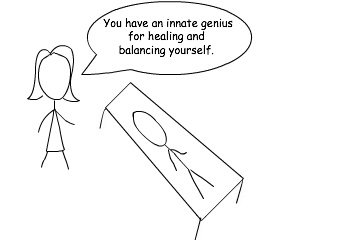The Power of Suggestion:
A Potent Tool For Mind-Body Healing
As a healer, the power of suggestion is an important tool you wield whether you are aware of it or not.
Hypnotherapist and massage therapist Shuna Morelli has observed that bodywork (massage) puts people into a state that is not different significantly, if at all, from hypnosis. This is also true for the profoundly relaxing effect of energy healing.
Our clients go into a deep, hypnosis-like state of relaxation. In this condition, as in hypnosis, they are highly impressionable. What we say to them in this vulnerable position can have a huge impact on their energy, mind, emotions, and physical well-being. We need to make sure that we use our words and thoughts to support, rather than to undermine, their well-being.
Everything we say during a session should, like an affirmation, be stated in a positive way, because what you say can influence that person's reality.
For example, if we make comments or observations about what we perceive energetically, they should be in a positive light, oriented toward change and growth and opportunities for change and growth.
We can help clients to reframe negative comments that they make about themselves or their situations. We can point out causes for hope and ways to look at things in a more positive way.
And of course, we should make a practice of treating and thinking of our clients with unconditional positive regard, and of "holding the space" for healing and evolution, even in the most difficult situations.
Turning Negative Statements into Positive Suggestions
But even with the best of intentions, it's easy to say things with a negative cast.For example, it is all too easy to unthinkingly say something like "Your energy feels stuck (or congested, or whatever) here," or "Your third chakra seems closed down." Ideally, those should be reframed as something more positive, like "Your energy seems to be calling for expansion (or recalibration, or more movement, or whatever neutral or positive term you feel called to) here," followed by a remark about any positive response that you feel.
Of course, it's not necessary to comment on what you perceive during a session. Many healers work in complete silence, and there's a lot to recommend that.
But even then, sometimes you're forced into commenting. And it can be especially easy to slide into a negative statement when a client frames a question negatively, such as "Does my heart chakra feel closed down?"
When that happens, I try to reclaim the positive power of suggestion, reframing the answer in a neutral or positive way. For example, I might respond with something like, "It feels to me that your heart chakra is ready to open more," or "It seems to me that your heart chakra is calling for a state of greater balance," or "If it feels that way to you, it's likely that you are ready for it to open more, so let's just work with it a little bit and see what happens."
Neutral terms like movement, change , balance and recalibration are useful in that they take away any implied judgement.
Reframings such as these are actually a part of the healing. Using the power of suggestion, you are shifting the energy of your client's habitual thought-forms, and by doing so, influencing their approach to their reality. That's powerful stuff!
Affirming Your Client's Innate Self-Healing Powers
It's also important, when your client is in a "suggestible" state, to use the power of suggestion to affirm his or her endless ability to balance and heal her/his energy, mind, emotion, and body.Since what we believe so strongly influences our reality, using the power of suggestion in a positive way like this is one of the best things you can do for her/his well-being. As I'm working, I often weave in comments like, "Your energy (and/or body) has a genius for healing and re-balancing itself."
This can be tricky in some cases, as you do not want to hold out false hope of a miraculous physical recovery for someone facing a mortal illness. (Although that certainly does happen, so you don't want to say anything that rules it out, either.) But even when a person is in the process of transitioning into non-physical form, you can affirm their ability to balance and heal and recalibrate on the energetic, emotional, and mental levels.
Another situation when affirming innate self-healing abilities requires a subtle touch is in cases where a long-term client just does not seem to be getting better. The danger here is that the client will blame her or himself for not healing, which is, of course, counter-productive.
In situations like these, rather than continuing to focus on their ability to self-heal, I try to track their process, pointing out any improvement that they may be overlooking. (It seems like it's human nature to overlook slow, steady progress, and it can be very encouraging to someone to help someone recall, for example, that six months ago they couldn't sleep because of anxiety, and now they can, or that their headaches have gone from being constant to being intermittent.)
If there really has been no observable progress at all, I continue to express my faith that this is part of a process for them, and that even if we don't know what the process is, we can have faith that it is a part of their life journey and evolution. And whether or not I express it out loud, I always, always, "hold the space" for healing on some level.
Using The Power Of Suggestion: No Formulas
There are no strict formulas for this. It's more of an approach, a practice or a habit of mind. But just being aware of the power of suggestion will help us to keep our expressions positive. And, as with most efforts, we improve with practice.(Now quick, what are three positive things you can say about yourself? What are three things that you feel less than 100% positive about that you can reframe in a more positive way? Excellent!)
Go from Power of Suggestion to main Energy Healing Techniques page

Interested in learning more about energy, energy healing, and the chakras? Try my book, Chakra Care: Do-It-Yourself Energy Healing for a More Joyful, Loving, Fruitful Life. You'll learn
to clear, nurture and support your chakras with 500 fun, down-to-earth
activities. A user-friendly, practical guide, available as a paperback
or Kindle. Learn more or buy it here.
